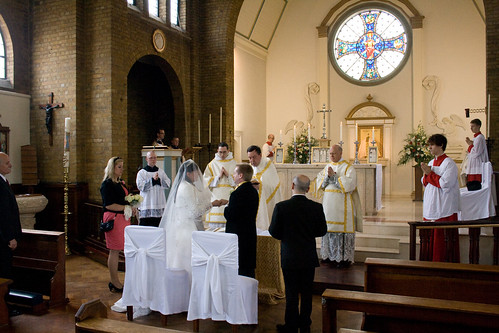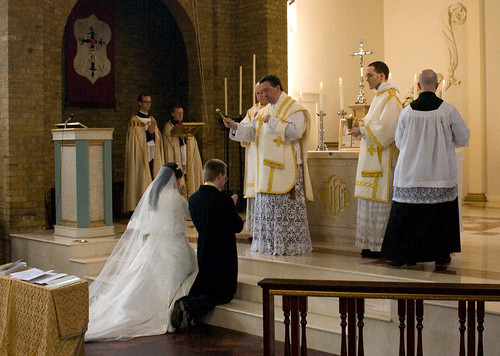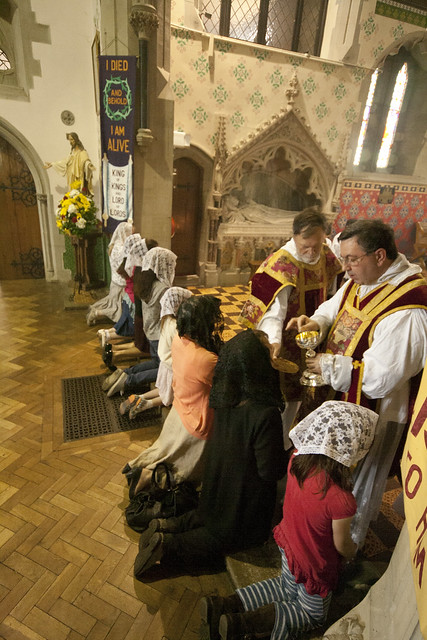
Over the years liberals like Mgr Basil Loftus have thrown out all kinds of half-baked ideas about what, in practice, the Church could do to be more 'Merciful' in relation to marriage and divorce. Loftus has suggested, for example, that somehow it be possible for a baptised Christian couple to contract a valid natural marriage, since under certain circumstances natural marriages can be dissolved by the Church allowing for remarriage. This raises incredibly complicated theological and canonical questions, and I really don't see how it would solve anything even if it were possible. If a couple's marriage is declared non-sacramental, that is a decree of nullity. If they want to divorce and remarry, they can. If they want to make their marriage sacramentally valid, they can. How does saying that they have a natural marriage help anyone?
The obvious way forward might seem to be simply to expand the grounds, or the interpretation of the grounds, for declarations of nullity. But this is more difficult than it looks. Marriages are null, essentially, if either party did not make a free and sincere marriage vow to marry the person he or she thought they were marrying. This can mean that undisclosed mental health issues can invalidate a marriage, undue pressure to marry, or a prior determination not to be faithful or fruitful within marriage.
What the liberals would like to see (and this is why they like the Orthodox practice) is a ground for annulment along the lines of grounds for secular divorce: something like 'irretrievable breakdown of the relationship'. But this cannot be a basis for determining the nullity of a marriage, which is why the Orthodox talk not about nullity but 'death'. For it to be null it has to have been null from the first moment, at the Altar rails. That is what nullity - sacramental invalidity - means: it was never valid.
I've already written about the possibility of adopting the Orthodox practice. This illustrates the problem of trying to create a hybrid position.
And here's another thought. It is not usually regarded as 'pastoral' to make it harder to perform a sacrament. And yet that is what the liberals are trying to do with their development of the theology of marriage. They want, in fact, to make getting validly married as difficult as possible. Pope Benedict remarked laconically:
We run the risk of falling into an anthropological pessimism which, in the light of today's cultural situation, considers it almost impossible to marry.
This is perhaps the ultimate fairness: not 'marriage for everyone', but 'marriage for no-one.'
Perhaps you can, instead, interpret the existing grounds of nullity in an elastic way, and it is often said that this happens to the point of abuse in some jurisdictions. Certainly, successive Popes have demanded that tribunals take their task seriously and strictly. Ultimately, tribunals are trying to establish a fact: was a sacrament validly accomplished, or not. They cannot make a marriage null. Their role is to reassure the couple and everyone that it is reasonable to proceed with a subsequent marriage. If they declare a marriage null which was not null, subsequent marriages will be objectively invalid.
Let us take a moment to consider that. Suppose tribunals became lax and just rubber-stamped applications. Catholics in good conscience would re-marry in church without being really free to do so. They would be in an objective state of grievous sin, and the second marriage would not be sacramentally valid. They would not be in mortal sin - they would not go to hell for this - because mortal sin requires both gravity and consciousness on the part of the agent. But they would lack the graces which flow from the sacrament, which help to develop the marital relationship and assist them in raising their children. Furthermore, the exercise of their marital duties, however heroic, would lack merit, and they could not, through them, grow in virtue. They would be a lot worse off than those in valid natural marriages. It is a bad situation to be in.
The idea that this situation should be encouraged for the sake of 'Mercy' is simply appalling. Essentially the proposal is to rob Catholics of their confidence that tribunals can establish the facts to a reasonable degree of certainty, and therefore of their confidence that they are free to remarry. If this is Mercy, give me Justice...

Here's the final option. Leave the tribunals alone and just focus on what happens to Catholics who have remarried outside the Church. They have ignored the fact that their first marriages were (or might be) valid; they have defied the Church, their former spouse, and Our Lord's words, to establish an adulterous relationship, and have furthermore raised this adulterous relationship to the status of a legally recognised and binding contract. Their adultery is no longer something private, which we might ignore, or simply not know about. They force it on the attention of the state and of society: they want to be known and Mr & Mrs Smith. They come into church and queue up for communion. What should the priest do?
Well, he can give them Holy Communion: that's what the liberals want to hear. Why not? Canon Law says otherwise, but Canon Law - say the liberals - can be changed or ignored. (They've certainly put in a lot of practice doing the latter.) Isn't this a Merciful solution?
Now these couples are not 'in good conscience'. Their sin is, as I have noted, a self-conscious and deliberate public violation of the Natural Law. They may, of course, have convinced themselves that the Church is wrong about marriage, but the point of the example is that they are painfully aware of the incompatibility between their state of life and the Church's discipline.
The public nature of their marital status means that ordinary considerations of scandal, in dealing with sinners asking for Communion, are reversed. Ordinarily, if a priest knows privately, or under the Seal of Confession, that a person asking (publicly) for Communion is in a state of mortal sin, to refuse would be to publish this fact (detraction), and cause scandal to others. In this case, the priest knows publicly, and other people present know, of the sin, and the scandal would be caused by giving the Communion, not withholding it. So although the Communion of a private sinner is a sacrilege, the priest must go along with it. The opposite is the case with the public sinner.
And in this, of course, the public sinner is at a huge advantage. Yes, advantage. By what twisted logic, in what alternative, liberal, universe, is it not an advantage to be prevented from committing an sacrilegious act? It is true that the remarried divorcee may have committed it already in intention. But it is another matter actually to have received Our Lord sacrilegiously. As the Corpus Christi Sequence expresses it:
Both the wicked and the good
Eat of this celestial Food;
But with ends how opposite!
Here 'tis life; and there 'tis death;
The same, yet issuing to each
In a difference infinite.
How, pray, is it a work of Mercy to administer the means of spiritual death to a sinner? This is something which we need to keep in the forefront of our minds. The objective gravity of the sacrilegious Communion is one thing, certainly. I've been reading about the Medieval theologian William of Auxerre, who described this situation as 'throwing Christ into the latrine of the Devil' - the priest 'proicit corpus Christi in latrinam diaboli'. (He still thinks a private sinner should be given Communion, incidentally.) Liberals often say: oh Christ can take it. Well, consider then the subjective side, the effect on the sinner. If he is a public sinner, the priest is in a position to save him from at least this degree of involvement with sacrilege.
If you don't care about Christ, at least refrain from throwing the sinner into latrinam diaboli.

If you don't care about Christ, at least refrain from throwing the sinner into latrinam diaboli.

I have a hard time figuring why this is such an intricate and complicated question, except maybe in terms of its extent in the Church today. Changing doctrine or ''practice'' (whatever one understands it to be) does not seem to be the solution. Rigorous catechesis and a change of attitude amongst the clergy and laity alike is needed to solve this very damaging problem.
ReplyDeleteMarriage is after all a sacrament instituted by God and priests would be well advised to properly catechise those who want to get married and have them read/study Casti Connubii.
"They want, in fact, to make getting validly married as difficult as possible"
ReplyDeleteThank you for making this point. As a married man I do not find it helpful or pastoral to be told by the hierarchy that my marriage is quite likely to be null and void.
I am in favour of putting the shoe on the other foot and questioning the validity of their Holy Orders.